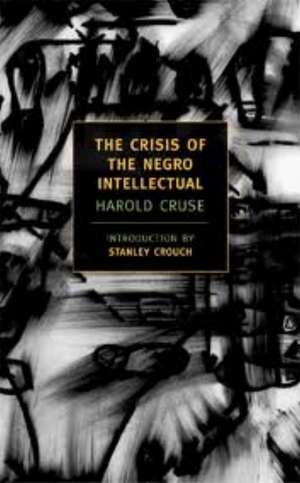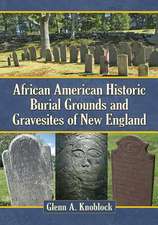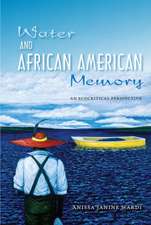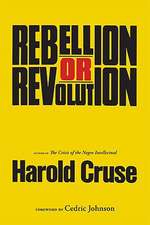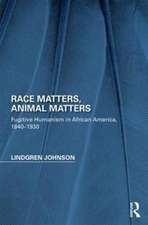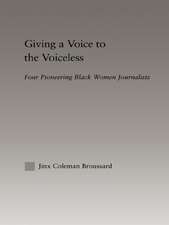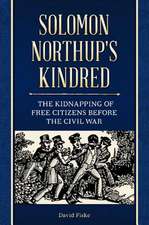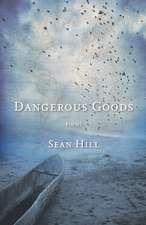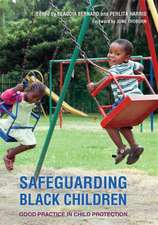The Crisis of the Negro Intellectual: A Historical Analysis of the Failure of Black Leadership: New York Review Books Classics
Autor Harold Cruseen Limba Engleză Paperback – 30 apr 2005
Din seria New York Review Books Classics
-
 Preț: 88.86 lei
Preț: 88.86 lei -
 Preț: 99.24 lei
Preț: 99.24 lei - 16%
 Preț: 79.25 lei
Preț: 79.25 lei -
 Preț: 119.57 lei
Preț: 119.57 lei -
 Preț: 124.55 lei
Preț: 124.55 lei -
 Preț: 98.73 lei
Preț: 98.73 lei -
 Preț: 83.30 lei
Preț: 83.30 lei -
 Preț: 182.08 lei
Preț: 182.08 lei -
 Preț: 102.47 lei
Preț: 102.47 lei -
 Preț: 76.46 lei
Preț: 76.46 lei -
 Preț: 174.64 lei
Preț: 174.64 lei -
 Preț: 110.73 lei
Preț: 110.73 lei -
 Preț: 96.27 lei
Preț: 96.27 lei -
 Preț: 94.01 lei
Preț: 94.01 lei -
 Preț: 119.36 lei
Preț: 119.36 lei -
 Preț: 101.24 lei
Preț: 101.24 lei -
 Preț: 85.97 lei
Preț: 85.97 lei -
 Preț: 142.67 lei
Preț: 142.67 lei -
 Preț: 102.25 lei
Preț: 102.25 lei -
 Preț: 103.29 lei
Preț: 103.29 lei -
 Preț: 113.30 lei
Preț: 113.30 lei -
 Preț: 100.59 lei
Preț: 100.59 lei -
 Preț: 123.50 lei
Preț: 123.50 lei -
 Preț: 107.40 lei
Preț: 107.40 lei -
 Preț: 174.03 lei
Preț: 174.03 lei -
 Preț: 107.44 lei
Preț: 107.44 lei -
 Preț: 89.27 lei
Preț: 89.27 lei -
 Preț: 85.34 lei
Preț: 85.34 lei -
 Preț: 90.09 lei
Preț: 90.09 lei -
 Preț: 87.20 lei
Preț: 87.20 lei -
 Preț: 99.60 lei
Preț: 99.60 lei -
 Preț: 85.16 lei
Preț: 85.16 lei -
 Preț: 127.42 lei
Preț: 127.42 lei -
 Preț: 133.18 lei
Preț: 133.18 lei -
 Preț: 136.91 lei
Preț: 136.91 lei -
 Preț: 105.17 lei
Preț: 105.17 lei -
 Preț: 161.86 lei
Preț: 161.86 lei -
 Preț: 90.72 lei
Preț: 90.72 lei -
 Preț: 88.86 lei
Preț: 88.86 lei -
 Preț: 94.83 lei
Preț: 94.83 lei -
 Preț: 120.63 lei
Preț: 120.63 lei -
 Preț: 111.96 lei
Preț: 111.96 lei -
 Preț: 95.45 lei
Preț: 95.45 lei -
 Preț: 97.50 lei
Preț: 97.50 lei -
 Preț: 109.26 lei
Preț: 109.26 lei -
 Preț: 81.66 lei
Preț: 81.66 lei -
 Preț: 100.18 lei
Preț: 100.18 lei -
 Preț: 75.23 lei
Preț: 75.23 lei -
 Preț: 91.13 lei
Preț: 91.13 lei -
 Preț: 94.67 lei
Preț: 94.67 lei
Preț: 177.11 lei
Nou
Puncte Express: 266
Preț estimativ în valută:
33.89€ • 35.48$ • 28.11£
33.89€ • 35.48$ • 28.11£
Carte disponibilă
Livrare economică 19 martie-02 aprilie
Livrare express 04-08 martie pentru 38.28 lei
Preluare comenzi: 021 569.72.76
Specificații
ISBN-13: 9781590171356
ISBN-10: 1590171357
Pagini: 594
Dimensiuni: 135 x 205 x 33 mm
Greutate: 0.64 kg
Editura: NEW YORK REVIEW OF BOOKS
Seria New York Review Books Classics
Locul publicării:United Kingdom
ISBN-10: 1590171357
Pagini: 594
Dimensiuni: 135 x 205 x 33 mm
Greutate: 0.64 kg
Editura: NEW YORK REVIEW OF BOOKS
Seria New York Review Books Classics
Locul publicării:United Kingdom
Notă biografică
Harold Cruse (1916-2005) was born in Petersburg, Virginia, the son of a railway porter. He was raised from a young age in New York City, where he attended high school, after which he served with the Army in Europe during World War II. Cruse attended the City College of New York, although he did not graduate, and was a member of the Communist Party for several years. He also wrote a number of plays and, in the 1960s, was co-founder with LeRoi Jones (Amiri Baraka) of the Black Arts Theater and School in Harlem. After publishing The Crisis of the Negro Intellectual in 1967, Cruse was invited to lecture at the University of Michigan, where he taught in the African-American studies program until his retirement as professor emeritus in the mid-1980s. Harold Cruse was also the author of Rebellion or Revolution?, Plural But Equal: A Critical Study of Blacks and Minorities and America’s Plural Society, and The Essential Harold Cruse: A Reader.
Stanley Crouch is a columnist, novelist, and essayist. Since 1987 he has served as an artistic consultant at Lincoln Center and is a co-founder of Jazz at Lincoln Center. He is the author of Notes of a Hanging Judge, Don’t the Moon Look Lonesome, The All-American Skin Game, Always in Pursuit, and The Artificial White Man.
Stanley Crouch is a columnist, novelist, and essayist. Since 1987 he has served as an artistic consultant at Lincoln Center and is a co-founder of Jazz at Lincoln Center. He is the author of Notes of a Hanging Judge, Don’t the Moon Look Lonesome, The All-American Skin Game, Always in Pursuit, and The Artificial White Man.
Recenzii
"Harold Cruse wrote The Crisis of the Negro Intellectual for the moment and for the future. He succeeded in both….Cruse’s book not only reflected the frustration, anger and confusion of its time, it also promised an explanation and a solution…an enduring document."
— TLS
"Eloquent, passionate, forceful—Harold Cruse has had an electrifying impact on an entire generation of African American intellectuals."
— Gerald Horne
"Crisis dwarfed almost all other books of the period when it came to bringing together politics, art, and social movements related to or inspired by the Afro-American condition."
— Stanley Crouch
"Cruse repositioned the interpretive axes of the study and conduct of black political debate. Where Malcolm X was the intellectual inspiration of Black Power and Stokely Carmichael (Kwame Turé) was its principal ideological architect, Cruse was without question its definitive critical interlocutor."
— Adolph Reed, Jr., New School University
"When all the manifestoes and polemics of the Sixties are forgotten, this book will survive as a monument of historical analysis—a notable contribution to the understanding of the American past, but more than that, a vindication of historical analsis as the best way, maybe the only way, of gaining a clear understanding of social issues."
— Christopher Lasch, New York Review of Books
— TLS
"Eloquent, passionate, forceful—Harold Cruse has had an electrifying impact on an entire generation of African American intellectuals."
— Gerald Horne
"Crisis dwarfed almost all other books of the period when it came to bringing together politics, art, and social movements related to or inspired by the Afro-American condition."
— Stanley Crouch
"Cruse repositioned the interpretive axes of the study and conduct of black political debate. Where Malcolm X was the intellectual inspiration of Black Power and Stokely Carmichael (Kwame Turé) was its principal ideological architect, Cruse was without question its definitive critical interlocutor."
— Adolph Reed, Jr., New School University
"When all the manifestoes and polemics of the Sixties are forgotten, this book will survive as a monument of historical analysis—a notable contribution to the understanding of the American past, but more than that, a vindication of historical analsis as the best way, maybe the only way, of gaining a clear understanding of social issues."
— Christopher Lasch, New York Review of Books
